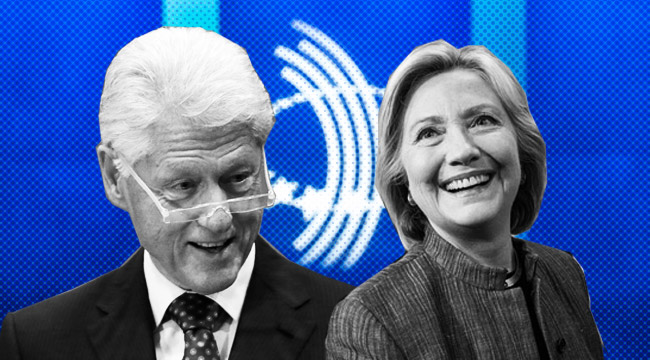
It’s alleged to be many things, from shadowy front for political shenanigans to towering modern humanitarian achievement, largely because few people seem to know what the Clinton Foundation is. What does it do? Who funds it? Do the allegations against it have any merit? And why is it so controversial?
The short answer is the Clinton Foundation, started in 2001 by Bill Clinton, is a collection of charitable initiatives run by the board of the Foundation, which includes the Clinton family. These range from the Clinton Health Access Initiative, which provides medical care in the Developing World and in struggling areas, to the Clinton Development Initiative, which works to address the root causes of poverty. Essentially, it was Bill Clinton’s attempt to parlay his retirement from politics into philanthropy, and these efforts have been successful beyond what anyone anticipated.
The foundation has an unusual structure in that instead of handing out charitable grants, it hires staff and uses its donations, more than $2 billion total over the last fifteen years, to develop and launch its programs. This unorthodox structure has, naturally, set the Foundation up for criticism, as that can mean its operations are more opaque than your average charity. Charity Navigator put it on its “watch list” for a time, although once the foundation offered up detailed financial paperwork, including the 990 tax forms that have always been available to the public, the watch-list status was deactivated. Still, the unusual structure remains confusing for some, something that can be compounded by both Hillary Clinton’s political activity and who’s donating to the foundation itself.
Who Funds The Clinton Foundation?
The Clinton Foundation is funded by donors across the political spectrum, and some names are a surprise. For example, Tom Golisano (well known to New Yorkers as the man behind a 2009 political crisis in that state and a noted campaigner against the Electoral College, which would benefit the GOP in Presidential elections) has personally contributed millions and is one of the foundation’s top individual donors. A browse through the donors page also reveals governments, energy corporations, well-known philanthropists, prominent foreign politicians and businessmen, an individual going by the unusual pseudonym John D. Mackay, and a host of others. In 2015 alone, their donations totaled $223 million.
It’s an unusual mix of donors for a charity, not least because Bill Clinton has been relentless in his efforts to promote it. Then again, there’s not much to compare it to, since a 501c charity like the Clinton Foundation is under no obligation to disclose its donors. But it has created issues for the Foundation in the past, and it’s causing trouble even now.
Have There Ever Been Any Ethical Violations?
One of the issues of the Clinton Foundation is simply that it sits in uncharted waters. The idea that the wife of a former President might not only seek political office after his term was up, but also potentially reach the highest office in the land has simply never been seriously considered in any legal or financial context. And the problem with exploring new legal frontiers is that plenty of pitfalls should be expected.
One thing that’s crystal clear is that the Clintons don’t profit from their Foundation. The Foundation, according to its own documents, has never paid the Clintons. In fact, what they charge in speaking fees goes, according to them, directly to the Foundation. Similarly, if you examine their private tax returns, it’s fairly simple to track where the income comes from and where it goes in the Clinton household.
The fundamental accusation leveled against the Clinton Foundation, though, is that it’s a way for foreign governments to “buy” influence with Hillary Clinton, after a fashion. They can’t donate to her campaign directly, the logic goes, but they can donate to her foundation and get her attention that way. And the Clinton Foundation has struggled with this problem in the past. During Hillary’s tenure as Secretary of State, she signed an agreement to limit donations from foreign governments, one which the Foundation has stumbled over in a few instances.
What Will Happen To The Foundation If Clinton Wins?
Of all the issues surrounding the Clinton Foundation, this is, by far, the murkiest. Again, the idea that a Presidential candidate could be the head of a billion-dollar charity supported by donations from foreign governments and private individuals is simply a situation that’s never existed before. The closest equivalent would be Herbert Hoover, who won the Presidency mostly on his highly praised humanitarian work in World War I, but Hoover stepped away from that when he took office. In a way, Trump and Clinton are in the same boat, as it’s not clear what legal bearing Trump’s extensive investments in real estate development would have on his decisions as President. In theory, Trump would need to put his assets into a blind trust, but that may not be legally possible for the Clinton Foundation, for there’s no equivalent (yet) of a blind trust for a charity.
Bill Clinton has already stated the Foundation won’t accept money from foreign governments or corporate donors while Hillary holds office, but that doesn’t rule out donations from private individuals. It may simply be that, if Hillary is elected, her entire family will need to step away and stop working for the foundation that shares their name until she leaves office.
It’s unlikely the Clinton Foundation would simply close. That would mean millions of dollars would somehow have to be returned, donated elsewhere, or divided among its various initiatives that would become their own charities. But regardless of what happens, it’s likely to remain a beacon of controversy for a long, long time.
